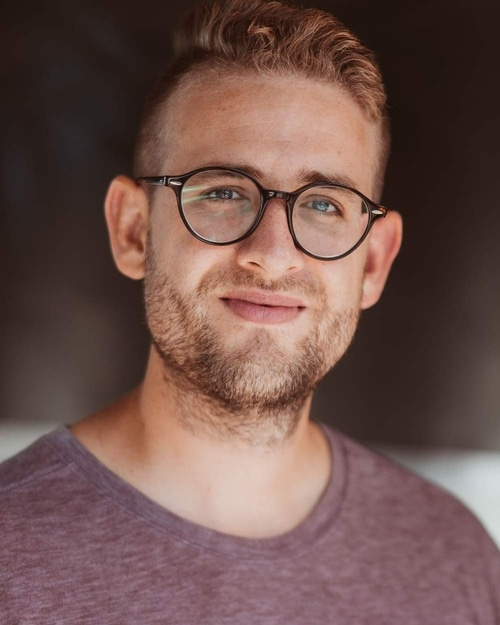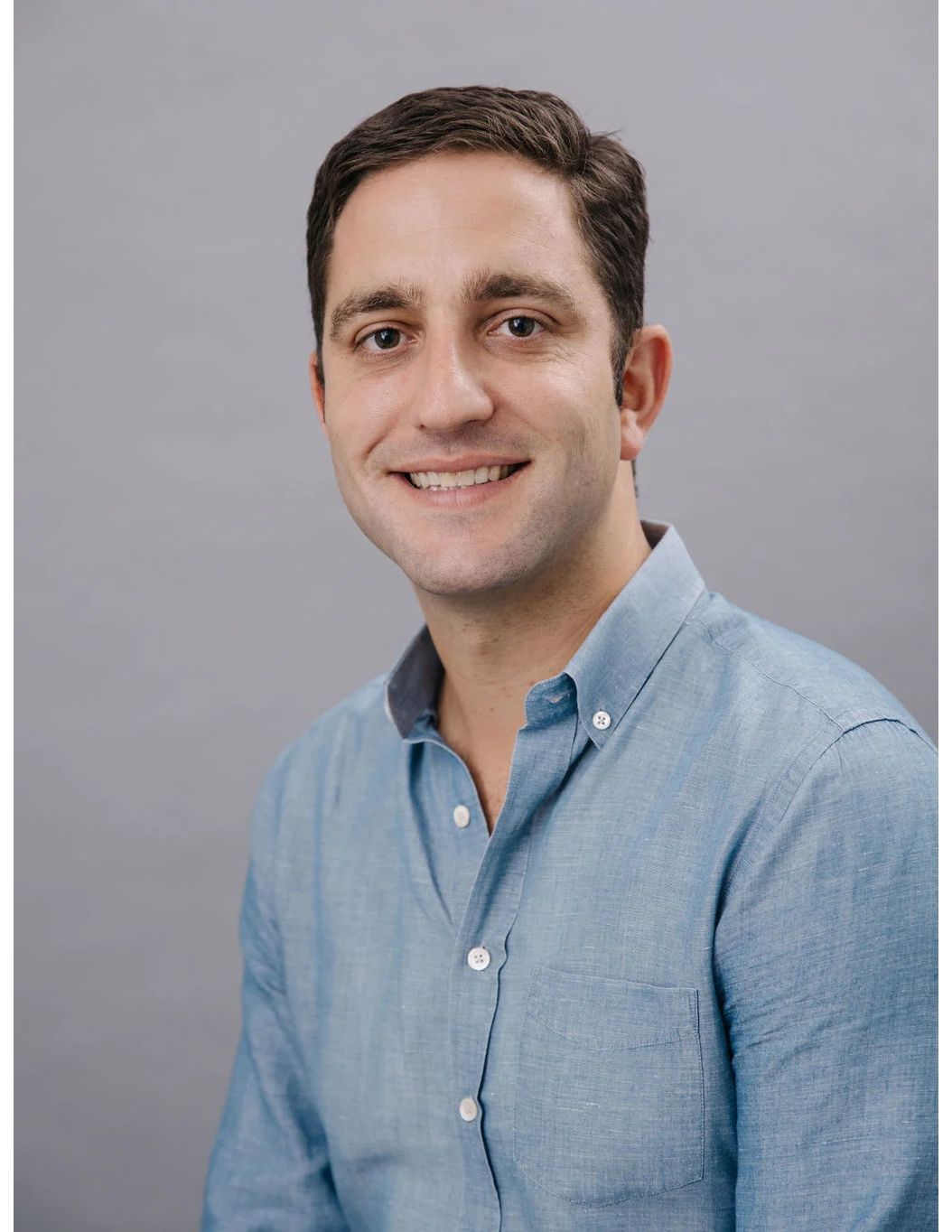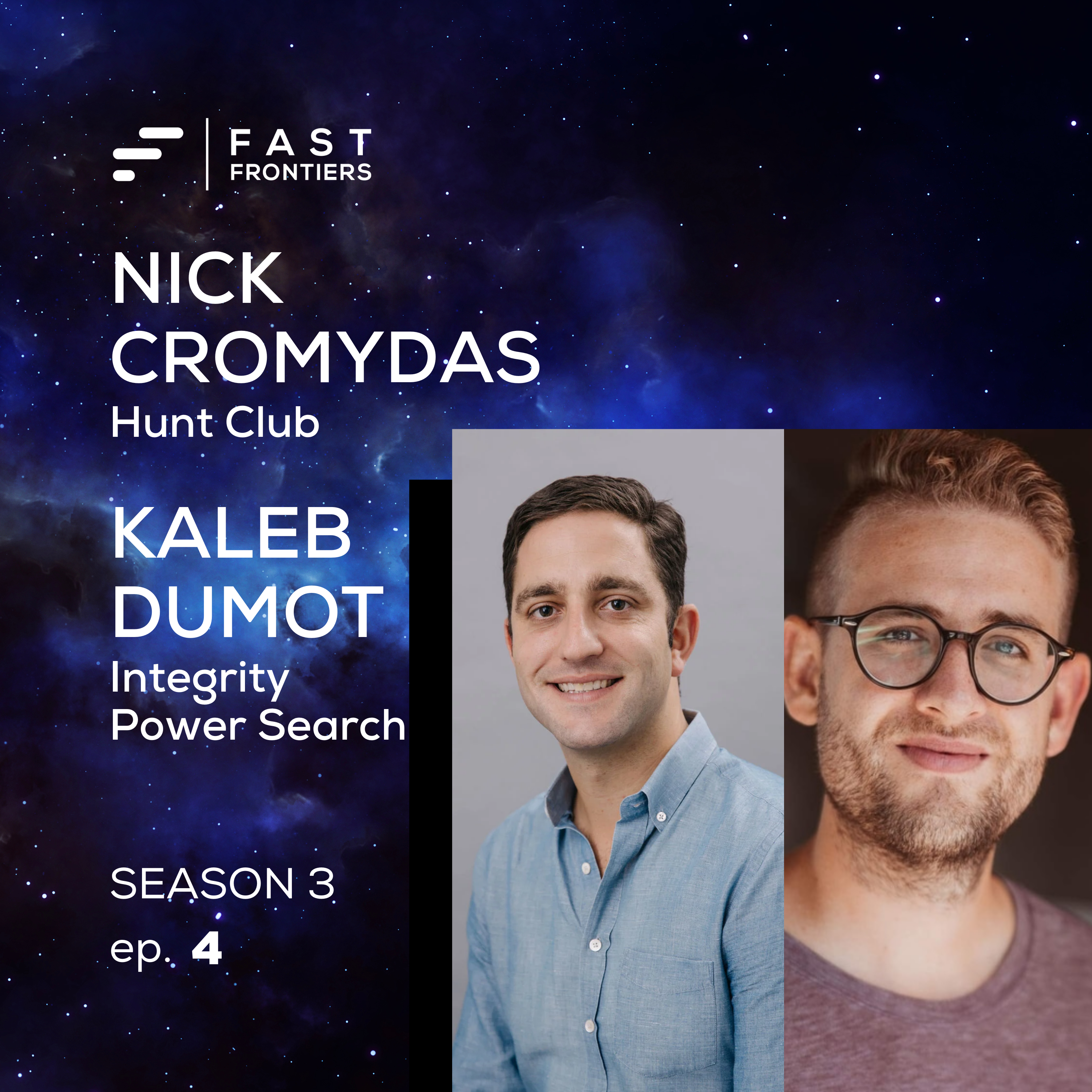S3 Ep 4. Nick Cromydas: Hunt Club & Kaleb Dumot: Integrity Power Search
- 0.5
- 1
- 1.25
- 1.5
- 1.75
- 2
Tim Schigel : Welcome to Fast Frontiers. I am your host, Tim Schigel, managing partner of Refinery Ventures. And in today's episode, we're talking with two great recruiting leaders in the Midwest, Nick Cromydas and Kaleb Dumot. Nick is co-founder and CEO of Hunt Club in Chicago, Illinois. Founded in 2015, Hunt Club is a tech enabled recruiting service helping companies find the best passive talent for every open position. He is also the founder of New Coast Ventures, a combination creative agency and venture capital fund. Kaleb is the founder and CEO of Integrity Power Search in Cleveland, Ohio, a boutique retained search firm for high growth startups and technology companies across North America. Since 2012, Integrity Power Search has successfully executed thousands of retained searches and their clients have collectively raised tens of billions of dollars in venture and private equity funding. In this episode, we're going to dive into the effects of COVID on remote work, hiring and recruiting, how we can eliminate friction in that first phone call interview, the ability to work remote opens up options for companies and potential hires and how you would develop trust remotely. Taking a job as incredibly personal so feeling that trust is important. The biggest theme or so what I hope you take away from this conversation is the importance of educating potential employees about their stock options and equity. There hasn't been as much exposure in the Midwest for employees to see the rewards from having equity in a company. Leaders need to educate and be upfront and authentic about the employment package, making sure they understand how the equity will be valued at each stage, from seed to series A and B and beyond. Please enjoy my conversation with Nick and Kaleb. All right, today is exciting. Our first duo interview. Today we have with us Nick Cromydas, founder and CEO of Hunt Club, a tech recruiting company in Chicago, and Kaleb Dumot, founder and CEO of Integrity Power Search in Cleveland, both of whom are on the front lines of innovation and recruiting and talent in the Midwest. We've had opportunities to work together on various projects and we're really interested today to dig into some of the trends as well as some of the myths that are out there about talent and recruiting so ton to cover. Thank you guys for being here.
Nick Cromydas: Thanks for having us, Tim. Excited.
Tim Schigel: Kaleb, since you started Integrity Power Search in 2012, why don't you kick off, just tell us a little bit about your firm and the origin story.
Kaleb Dumot: From a young age, as a kid growing up in the suburbs of Cleveland, I always knew I wanted to start a company. My parents always fought about money growing up and so I knew that deep down I never wanted to have a family like that. I grew up in a city where there's a lot of wealth, a lot of business owners and a lot of doctors, a lot of wealthy people and I looked around and thought, hey, if I made a bunch of money I won't have these problems at home. From 12 to 13, I was selling cards at school, Pokemon, things like that. And when I was in college I did five internships, knew I wanted to start a company, never knew what it was really going to be until I discovered recruiting and this entire industry. Basically graduated college, went to Kent State, started this company out of my parents' basement and that was eight and a half, nine years ago. Since then, we've hired over 2,000 people for startups and venture backed and private equity backed companies all across North America. We have 20 associates across the US and in three main practice areas. We do executive search, sales and marketing search and then tech recruiting for startups and high growth tech company.
Tim Schigel: Awesome. And you've done recruiting for companies that listeners might know like Root Insurance, Duolingo, StockX, Cameo, a lot of great successes there.
Kaleb Dumot: And Tim, you've been great for our business as well, so I appreciate that. All the love over the years, we've worked with four or five companies in your portfolio too.
Tim Schigel: Absolutely. That's what's so fun about this, we've all gotten to work together and experience the same challenges and also achievements. Nick, tell us more about Hunt Club.
Nick Cromydas: Yeah, yeah. I started Hunt Club in 2015, but really didn't go full time on it until 17. My background, Tim, which you know, that starts in the called New Coast Ventures in Chicago, which is a venture studio model where we're investing in early stage companies and incubating some of our own ideas and Hunt Club was the second. And it came out of really just some observations I had about the industry. I had a great friend that was an executive recruiter and he was incredible at looking at my LinkedIn, seeing who I was connecting to and asking for introductions. And one summer I had placed five people for him. He'd say, "Nick, I see you're connected to Tim, can I get an introduction? I've got this role." And I kept getting an email back from the people that I'd introduce saying, "Hey, I actually wasn't looking, but I took this job and I'm super excited about it and thank you." And so that piqued my curiosity about the space and how does it work? What's new? What's different? And I spent that summer shadowing all the big executive search firms. My CTO's father's a partner at one of the largest called Egon Zehnder. And looked at a couple others and just sort of realized none of them use any technology to power their process. In professional services, this is still one of the industry that still uses yellow legal pad and an archaic CRM and LinkedIn and that's it. Automation really hasn't taken foot yet, but I think the better insight was the best recruiters we sort of met, curated, cultivated these networks and called on these networks to access both talent and originated business. And so I thought, why don't we try and do something different where we build our own technology from scratch? We got a kind of 15% product and tech team growing to 30 this year, to help automate what can be an augment which can and then really leverage an expert network to find great talent so you can get the best marketer or if we're doing a CMO search, you can get hundreds of marketing leaders across the country referring on your behalf. And so that was sort of the story from the beginning. It hasn't changed much. The company's up to 70 people, growing to a 110, a 120 this year and really lucky to have tons of high growth relationships across funds and customers and trying to power talent in a different way. It's fun being on here with you because you've obviously been a great supporter and been friends with Kaleb for a while and a huge fan of him and the way he's built his business. Excited to talk about talent.
Tim Schigel: Yeah, this is fun because you guys not only are good at what you do, but you're also great entrepreneurs. I want to dig into both of those things, but first let's get to maybe the elephant in the room, which is, can you really hire technical talent in the Midwest?
Kaleb Dumot: I think for me on this question, Tim, there's two main things. One, in the Midwest, we have really, really top computer science programs. We have University of Michigan, we have Carnegie Mellon, we have Ohio State University. We have some of the best CS programs in the world and a lot of these folks are not moving to the coast now because it's just too expensive. They're staying home. You have access to this talent that traditionally would move, but is now staying home. And then two, one of the challenges that I think a lot of entrepreneurs have that we haven't really cracked the nut in the Midwest is, we have more Fortune 500 companies in the middle of the country, in the Midwest, than anywhere else in the US. And so there so much undiscovered talent in these companies that would do and excel very well in startups that you know entrepreneurs and recruiters like me have a hard time deciphering who's going to do well and who's not. But I think at our firm, we've tried to master the skill of finding undeveloped, unrecognized talent coming from big companies or maybe even governments that would excel in a hyper-growth company. I will admit though that, most people that work at big companies will fail at a startup but if you can master that art of interviewing and finding those true 10X players inside of big companies, you can win here in the battle of talent in the Midwest.
Tim Schigel: Yeah. That's a good point. One of our CEOs brought this up recently to us the, well, first of all, in the dev role sometimes the having the startup experience may, depending on the stage, may or may not be the most important factor. But the point they were making to me is there are these great developers in these bigger companies, they just happen to be on different tools. You shift them over to some of the kind of web based, cloud based tools, they are just fine. They're absolutely great and people don't get this. The other thing though, back to the startup point, interested in your reaction to this, that I've observed is I hear somebody complaining, "Oh, heck I can't find a developer for this or that." They're looking for one person and it's very different when you're looking for one versus when you're looking to hire 10. Because again, they're willing to make the leap if there's other people going. If a company has good funding and they have 10 open positions or 20 open positions, you're more likely to fill those than you are for one, because nobody's going to make that leap from that, whatever. Security they may have in a bigger company to be one of very few number of engineers.
Nick Cromydas: Yeah. I think there's two points to unpack there. The first is security. I think the great news about I think some of the trends that I'm seeing is there's more capital flowing to Midwestern companies. Balance sheets are getting bigger, compensation packages are getting closer to big company in market with some upside in equity. And certainly, over the course of the last 12 months or so, you're seeing a higher velocity of IPOs and equity becoming real liquid cash and hearing tons of stories to that regard. I think it's helping in fueling a lot of the effort where people's risk tolerance are starting to come into play where they're actually for the first time associating the opportunity risk of not joining a growth stage startup versus staying where they're at and what that can mean kind of for their family, both short and longterm. I think there's a lot of really good trends helping on those equations, but I'm the same way, I think in technical talent, I think there's a huge opportunity to figure out who are great leaders or great individual contributors at large companies and rescale them for the pace of a startup. I think that's probably one of the best supply opportunities that you can access.
Tim Schigel: What are your thoughts on that? And related to that, one of the things if you're in Silicon Valley, anybody you hire, they understand stock option agreements and stock option plans and they don't, it tends to be in the Midwest. Are you seeing that change?
Nick Cromydas: Slowly but surely. I actually think and I wanted to call this out as one of the biggest challenges that entrepreneurs and startups face in the Midwest is just educating teams and educating potential hires on stock options and equity.
Tim Schigel : But in Silicon Valley, if you didn't make money on equity, your friends have. And when you watch your friend buy a house for 50% more than it's worth in cash, you start going, wait a minute. And if that's not modeled for you on Main Street in Cincinnati, then you just don't know any different.
Kaleb Dumot: Yeah. I think the education piece is huge. And unfortunately, if you look at companies like CoverMyMeds, for example, I think they sold for $1.9 billion to McKesson. Only the top, I believe 15, 25 people in that exit made it really any money at all. Now they built an incredible team and they built an incredible culture and they helped so many people break into technology in from a startup perspective, but nobody really created a wealth event there but the top 15 to 25 people. And so I think to get the actual flywheel spinning in these ecosystems, I think in Chicago, it's happening more, but in other cities in the Midwest it's not. Entrepreneurs and CEOs, they need to give equity and they need to educate their teams on the value of equity. One of the things that we do with all of our clients when we're educating them on how to give an offer is we say, "Okay, here's the base salary, here's the stock options, here's the equity and here's what they're going to be valued at each stage. At series A, here's what your equity's going to be valued, here's what your equity's going to be valued in series B, series C, so employees can get a real taste for, okay, this is what it can mean by why I should take a pay cut and leave Google and join this new hyper-growth startup."
Tim Schigel: Yeah. What are some of the learnings you've had from that, that you would share to founder CEOs right now, if they've just raised a series A and they need to hire? What kind of things? What would you suggest that they start thinking about?
Nick Cromydas: It's a hard one because every founder has defied the odds of getting to a point where you can raise external capitals. I think the best thing founders can do is just be really authentic on look, here's an equity grant. My hope is it's worth this, but you're going to learn and have more autonomy and have more fun along the ride, getting to build. And we're playing for a high value outcome and it could be worth this but what you're really playing for is the experience of being part of something where you're creating impact. And then the equity is sort of the icing on the cake. I think too often founders take a very aggressive approach and you're going to be a millionaire off this grant. And I think it turns people off the wrong way in the Midwest. We sort of lean in more on the ability to have actual impact and then the icing on the cake being the money you can make when there's great financial outcome.
Tim Schigel: Have you also seen, sometimes they think, oh, it's the Midwest and we're going to give him equity and therefore cash compensation can be lower or it's going to be lower. And I've found that's, our real estate prices are a heck of a lot lower If you have 20 people or 50 people, the price you're playing for real estate versus in New York or in the West Coast is hugely different. But I don't know that it's always wise to think about that and think about, in other words, you're going to pay that talent equivalent to what you're going to pay that talent almost anywhere in the country. If you really want to hire the best talent, don't think about going cheap on cash compensation. What are you seeing?
Kaleb Dumot: Yeah, it's a great question. I think every company approaches it differently. I'll tell you a couple quick stories. Root Insurance, when I started working with them, they were two co-founders basically in a coffee shop and they grew to I think it was a $7 billion IPO in five years. And when we were building that founding team, we were really integral part of that, Tim. We did a ton of education on equity and we did a ton of education on taking pay cuts. We placed people that were making $250K at Google, making $250 K at XYZ and we got them down to a $140, $150K, but now some of them are deca millionaires, it actually worked. And so at Root Insurance, it's a perfect example of where I hope the flywheel starts spinning in Columbus, for example, that a lot of these employees, they have earned a lot. They are going to start new companies.
Tim Schigel: Okay, so that's good. You did do the education and they understood the trade off, the equity versus cash. Nick, searches that you're doing, how many people are currently in the Midwest? And how many people are you hiring either back to the Midwest or where there's a relo involved and a difference in geography and culture?
Nick Cromydas: Yeah. 50 to 60% of our customer base is Midwest, the rest is national. From the Midwest perspective, I think it's interesting. Relo is something that it was really, and Kaleb, I'm curious if you're seeing the same trends, but 12 months ago before COVID, probably about 80% of our customers had a pretty hard either relo or you must be in this market mandate on the search. And now I think it's probably 20% of our customers. It's dropped relatively dramatically. I think relocating back to the Midwest is becoming more prevalent based on a lot of other factors that we talked about, real estate prices spiking, people realizing that in a pandemic environment, they want more space and want more a backyard, or maybe more areas to hang out with their family than being locked up in a condo. I think there's a lot of trends that are actually getting talent back to the Midwest right now that have nothing to do with the fact of companies trying to relocate them. And I think there's a lot of interesting trends now that are happening, where you can hire the best talent anywhere, which is going to help open up doors for higher growth for Midwest companies. And I think the challenge we have here is there are very few people that have seen a series B company to an outcome in the Midwest. I think what this should inevitably do is actually help us grow a lot of our Midwest companies, because for the first time people are open to the idea of, I'm going to hire that great VP of marketing that came from whatever company in Silicon Valley, because they saw all the way through an IPO and now they can join a Chicago based company, a Columbus based company or Cincinnati based company. We're seeing a lot of trends of people relocating just because they're at a stage of life with family and want to get back to a place with more space and cheaper costs. But I think we'll actually see more virtualization over the next few years where Midwest companies hire people from anywhere.
Tim Schigel: Yeah. Kaleb, what have you seen in terms of the potential kind of permanent effects of COVID and remote work?
Kaleb Dumot: Even prior to COVID, Tim, companies from Silicon Valley and New York City and LA and the big coastal cities, they were coming to the Midwest to poach our talent and to hire our talent. Now COVID has democratized access to talent in my opinion. And I just feel like right now we're at this really interesting inflection point. And like Nick said, in the Midwest, we are and really any company anywhere is able to hire talent from anywhere because everything's online, everything's remote. But when things get back to normal, it's going to be interesting to see what happens. I find that, I was just meeting with a VC yesterday, who was a guy that lived in Silicon Valley that just moved to Arizona and all of his buddies have moved to Miami and Austin. And it's interesting, the dollars are leaving Silicon Valley. That's a huge trend. A lot of the VCs are leaving, not just the talent. And so it's unfortunate. I wish more of the VCs were coming to the middle of the country in the Midwest, but they're not. It seems like they're really flocking to the Boulders of the world, the LAs of the world, the Austins of the world, the Miamis of the world. Nick, I'd be curious your perspective on this. But I think like we can continue to win here if we're able to leverage talent from those other cities where people are moving to, that have seen series B to exit, like Nick said. But the one other big macro trend that I see is people are not really relocating during the pandemic. It's pretty difficult to get people to leave X city to come to Y city, unless they have deep ties, Tim, to Ohio or to Michigan or to Pennsylvania. But we spend a lot of time doing that. When we were running big executive retained searches, a lot of our focus is on finding people that went to Carnegie Mellon or went to University of Michigan or went to Ohio State or went to Penn State and they want to come home. That's how we run our searches from the executive side, but those are some of the macro trends I'm seeing.
Tim Schigel: Yeah. You just mentioned kind of really tapping into those connections that are already there and the networks and Nick, your whole firm is based on that premise and you're investing a lot in technology on that. Can you share with us a little bit more the role that networking plays in recruiting and why that's going to be maybe even more important going forward?
Nick Cromydas: Yeah, I think, our bet is going to be everything going forward. Probably for two or three reasons. The first is when you switch jobs, it's one of the most personal moments you can have. You spend more time with your coworkers and your colleagues and on the road with customers or whatever it might be than you generally do with your family. And so that usually requires trust. I'm going to go do this thing and I believe in this, especially in startups. I believe in this and I believe in this because of X, Y, and Z. And X can be either a trusted introduction, referral, great diligence, watching a macro trend of growth, all these things. And so when you talk about a virtual world of talent, where you can really recruit anybody anywhere, it's really hard for any one recruiter or any one firm to build really deep network effects in every market, in every function in the United States to truly access the total candidate pool or total addressable market of potential talent. And so our big bet is that, if you can build out these micro-communities of leaders in each market and those leaders are super wired into who's great, who's not and who might be an awesome fit because they've worked together and known each other for a while, you can actually start to expedite trust from the community and get someone that traditionally wouldn't look at a Columbus based business or a Chicago based startup to actually listen actively. And there's a huge difference between when someone actively participates versus passively participates in a wide range of recruiting metrics, whether it's speed to actual close, the actual probability of getting them to join a company. And we believe foundationally it's all because of trust. I think that recruiting is going to be even more complex for that reason alone now, because you can hire anywhere, but now you also have Fortune 500s trying to do the David and Goliath thing, competing with startups, trying to access the same talent pool, with waving your war chests, you've got startups raising more capital and in the Valley, large tech companies now competing in different talent pools in atypical places. It's going to be really messy as people try to figure out how to actually win and court the best people. And so we sort of believe the best way to do that is through trust.
Tim Schigel: Yeah. I think that's a very good point and going to be very important. From a tactical standpoint, how is just the process of interviewing changed? And how companies adapted to interviewing when you've potentially never meet a person live? Nick, we went through that with our hire that we did through and with you where we were having to get kind of creative.
Nick Cromydas: Yeah. I was just bummed that we couldn't all fly down together and hang out in your office right now, because I think it would have been awesome to close the deal three months faster. I'll take a stab and this and then would love Kaleb, to hear his thoughts too. It's changed a ton. The first thing that I think is really interesting is the friction of taking an interview has completely gone away. There's no more ducking into a conference room or walking around the block or doing some of the traditional things that those who are actively employed or gainfully employed would have to do to get an opportunity. That's one. I think the second thing is it's way harder to build trust in a virtual interaction. I think people are getting better at it now. Where people are learning how to communicate, learning how to build a relationship, learning how to understand somebody only in virtual interactions. But going back to what I mentioned earlier, it's a personal thing. Switching jobs is very personal. If you can't find ways to build trust in a virtual experience is going to be really difficult for you to land great talent, especially on the senior side of things. Kaleb, love to hear your thoughts.
Kaleb Dumot: Yeah, one of the challenges is building trust remotely because I think face to face interaction is huge when you're interviewing folks. And like we've been talking about, the war on talents is greater than ever. And so, I've been shocked and almost appalled of how many candidates that we've placed that have gotten offers accepted, ready to start at this new company and then two days before they're like," Hey, we got a better offer and we're going to do this now." And so I feel like, it's really, really challenging to build trust, but companies can do several things during the interview process, to build that camaraderie and build that trust. And they have to know once a person accepts a job, they're not automatically going to start in two weeks or three weeks or whatever, they have to continue to build trust and have a lot of touch points with those new hires in between that grace period. Because number one, they're going to get a counteroffer if they're any good from their current employer, which is always a tricky, hairy situation. And then number two, I mean, if they're any good, they're going to get hit up all day, every day by other recruiters. And so opportunities are flying across everybody's desks and the trust and loyalty's not there. What we advise our clients is once somebody accepts an offer, you got to have a lot of touch points and build that emotional trust and rapport with them or you're going to have a 50/50 chance of them showing up on the first day.
Tim Schigel: And when you're building trust, I hate to use the term kind of tips or techniques, but I am looking for you. Is there some practical advice or ways to structure the interactions that you've seen that work particularly well?
Kaleb Dumot: I think just the more touch points with more people on your team the better of who they've met in the interview process. Send them a gift, send them a t-shirt. Have the hiring manager that they're going to be reporting to call them and tell them how excited they are that they're going to be joining. Send them the computer, send them the onboarding stuff. Touch base with them every single day and have multiple people do it. If you follow that, you're going to win. And it's funny, we have these conversations with our clients and sometimes they do all this stuff and we still lose. It's not a bulletproof solution, but nine times out of 10, if you follow that, you will win, I think. Nick, what do you think?
Nick Cromydas: Yeah, I think it just removes it from transactional to relationship oriented. Where you used to be able to get away with treating recruiting interaction like a transaction. Take these steps and then join company. Now, and Tim you know this is a bit, I've played sports all my life growing up and in college, when you go on a recruiting trip in college, they stay for a full weekend and you eat every meal together. And they stay in your dorm room and you go to a match or a game. And I think it's more of that element where you really have to roll out the red carpet. You have to show vulnerability, you have to get them to meet the whole family and not just a couple touchpoints. And I think the more that you can think of every relationship as a relationship and not a let's get this butt in this seat, the higher batting average you're going to have.
Tim Schigel: What about individual Zoom sessions or calls versus group calls?
Nick Cromydas: Group interviews are really tough. I kind of agree with Kaleb where it's especially in the earlier stage of a process. Where you're trying to really understand, ask authentic questions, learn about the business. It's hard to build an interaction motion where you're talking without talking over each other or figuring out the cues of when to participate. I think in the beginning of a recruiting process, you should do one on ones and then at the end, if it's more about just getting to know each other or having a conversation about the bath of the business, I think groups can actually be powerful because you can learn to collaborate with each other and think about what it might look like working as a team, but in the beginning of the process, it's just awkward.
Kaleb Dumot: The one thing, my point on the group versus individual interviews is you don't want group bias when you're interviewing people. You don't want group think. You don't want the strong personality in the room to be the decider. Tim, if you're interviewing a candidate and you have three other people that all report to you on that interview and if you say this about the candidate right after the interview and you give your feedback to your team, that the people that report to you are going to have a less likelihood of disagreeing with you. If you have independent interviews along the way and then you share feedback independently, I think that's a better way to win and have bias out of the interview process.
Tim Schigel: One other, how about recording interviews? What's your policy there?
Kaleb Dumot: I'm all about it. As long as you're transparent with candidates that, hey, this is getting recorded. And especially for executive searches, we're going to be sharing this with the board, we're going to be sharing this presentation with the board. It happens all the time. As long as you're transparent with them, I don't see an issue with it.
Nick Cromydas: Yeah. Actually, one of our good partners is a company called BrightHire. They do some really cool things around recording and transcriptions and 80% of our candidates or talent that we talk to is okay with it, as long as you're upfront about what you're doing. 20% say, no, get it off the record. But I think transparency is just key there.
Tim Schigel: Well and it does seem this is one of the positives I think out of COVID that people are getting so used to Zoom and teleconferencing and we're seeing it and I've written about it a few times. Some of our companies that record different meetings or team meetings and you can watch afterwards and you can improve. Whether it's sales process or just team communications and it's a great learning tool that hopefully people are more comfortable with. Speaking of COVID, Kaleb, you have an interesting story I think just as an entrepreneur. You were at the time headed off for, was it a sabbatical?
Kaleb Dumot: Yeah. Still sad, man. That story's heartbreaking. I've been doing this work for eight or nine years now since I started my company and I promised my wife before we were going to start a family that, hey, we were going to go to Europe and do a three month trip. Were we were in Ireland, then we were in Scotland and then COVID hit. It was March 13th when I think Trump came on and said, "Hey, anybody that is a European is not allowed in the US." And so we had plans for three more months to go to Italy, to Spain, to Greece and really kind of live like Europeans. And I had, my team was all set up and excited to take on this challenge without me. And then COVID hit. I'm really grateful we came home, from a business perspective. Things really lit on fire. Everything went on hold. We went from 70, 80 retained searches to basically five or 10 in a month. And then, things really slowed down in April. May was a pretty tough month. And then fortunately, I'm sure this happened with you, Nick, but June the flood gates opened right back up. It was almost like a two month paralysis where everybody was paused. And then June, July, August. 2020, we had a bigger year than we did in 2019. But it was unfortunate that I wasn't able to do this big sabbatical, this big trip that we had planned to do.
Tim Schigel: I have a feeling you'll have another chance to do it, but I remember talking to you, I don't know if it was just when he came back or were about to come back and the world was changing and I admire you because you took action. You didn't let it just happen to you. You said, "Hey, I'm going to be engaging. I'm coming back and we're going to make sure that this business survives and thrives. We're not just going to take it."
Kaleb Dumot: 100%.
Tim Schigel: That was awesome. Nick, what have you seen in terms of your staff during that time and the way your business got through it?
Nick Cromydas: Same result. Everything freeze and pause and had 60 days of what is the world going to do? Not just Hunt Club, but what is the world going to do in something that's relatively unprecedented? And then I think, Tim, from all the CEOs I've spoken to with the exception of those unfortunately in hospitality or retail or travel, many of them received PPP. Many of them outperformed their forecast or their scenario plan on what would happen. And many of them froze or cut hiring so most businesses that we work with actually, were in a way better position because they became way more cost effective and ran way better over kind of Q2 of 2020 and that spring boarded into kind of acceleration and hiring and growth. We suffered the same stuff. It was terrible. We had to furlough a number of people and we're fortunate to have brought back quite a few of them.
Tim Schigel: Yeah. Well, good for you for getting through it.
Nick Cromydas: I had my first kid in November, so I felt like I was in quarantine with my first child, November, December, January and then I was in quarantine again. And now we're having our second. I hope my wife doesn't listen to this because I'm sure she'll be like, before number three, we need to go to Europe for three months or something like that.
Tim Schigel: Let's switch our hats for a second and just see if we can share some insights for people who are being recruited. For those looking, doing job searches or interviewing with companies, what advice would you give them?
Kaleb Dumot: I think before you start a job search, you should really identify the top three to five criteria that are most important to you that you want to see in your next opportunity. Really do some soul searching and figure out, okay, here are the things that I value the most and here's the things that I'm looking for, whether that's more autonomy, more interesting problems to solve, X, Y or Z industry, working on these types of problems, et cetera. Really get a clear picture for what you want in your next opportunity. And then when you're interviewing at companies, just pattern matching, figuring out how well does that match against what I really desire and what I'm really looking for? I think too many times people go into a job search not doing that soul searching and not really figuring out what they desire and then they end up in a place that they're really not happy.
Nick Cromydas: I think most people, frankly, it's really interesting. I would argue that 90% of the candidate pool that we talk to has no clue what they want to do next and sort of let the market guide them versus really thinking thoughtfully about their career path, talking to mentors and building more of a strategic approach. I think I'd echo what Kaleb said, it's your career, do the work on where you think from an educated perspective, you want to go next and then align that with the market versus the inverse. And I think the second piece of feedback I'd give in this particular environment is be really thoughtful on how many interviews you take with a single company. Just cause the friction of meeting people has decreased dramatically, doesn't mean that it's from a reputation perspective, it's the right thing to engage in a 10 to 20 hour process with a company and pull out. And we see that happening quite a bit now too, just because that friction is removed. I would encourage candidates to have the two, three things they care most about, stress test that in two to three hours of an interaction with the company and then be really thoughtful and if they want to proceed after versus some of the behaviors we're seeing right now.
Tim Schigel: One other constituent to talk about, I know a lot of your business comes from venture capitalists. Can you share a little bit about who you've worked with and some of the learnings or what you'd like your colleagues in the venture world to think about in terms of getting help from you in recruiting?
Kaleb Dumot: We've been really fortunate over the years. We've been working with Drive Capital when they first came to the Midwest, their exequator investors, we filled over 400 roles for them across executives, sales, marketing, engineering positions. Chris Olsen and Mark Kvamme have definitely been a big driver in our business, but we've worked with 50 other funds across the US. Sequoia recommends us quite a bit now. Xcel has. Refinery Ventures has. We've been super blessed. I would say for us, our bread and butter is definitely tech jobs. we started there, recruiting software engineers and that's where we fill the most amount of positions. Every year we fill between a 120, a 130 or so tech jobs and then 30 to 50 sales jobs and then probably another 30 to 50 executive jobs.
Nick Cromydas: Wide range, we got awesome relationships with tons of Chicago Bay species, your Hyde Park Ventures, your Chicago Ventures, your Lightbanks, kind of sounds it forth. And then been really fortunate to build like growing relationships with both coastal sides, whether it's your L Cattertons or your Main Capitals or your Xcels or your Sequoias and so on and so forth. We kind of feel fortunate that the world is sort of understanding the democratization of talent and how network effects can play and aligning still a lot of the ways that believe in trusted introductions.
Tim Schigel: Thank you. You guys, incredibly important part of the ecosystem here so I'm so glad that you took the time to share your insights and wisdom with the listeners. Just thankful for you both and how you've been able to help us in our companies. Wish you the greatest success. Thank you.
Kaleb Dumot: We're the lucky ones, Tim. You've been an been an awesome partner to both of us.
Nick Cromydas: That's exactly right. Thanks Tim.
Tim Schigel: Awesome. Thanks guys. Thanks for listening to Fast Frontiers. If you like our show and want to know more, check out our website fastfrontiers.com. If you enjoyed this episode, please share it with others and give us a rating and review on your favorite podcast platform. Join us next week when we bring you my conversation with Darcy Howe, founder and managing director at KCRise Venture Fund. The Fast Frontiers podcast is brought to you by Refinery Ventures. Our producer is Abby Fittes. Audio engineering by Astronomic Audio, marketing content and social media support from Content Callout and our podcast platform is Casted.
DESCRIPTION
In today's episode, we're talking with two great recruiting leaders in the Midwest, Nick Cromydas and Kaleb Dumot. Nick is co-founder and CEO of Hunt Club in Chicago, Illinois. Kaleb is the founder and CEO of Integrity Power Search in Cleveland, Ohio, a boutique retained search firm for high-growth startups and technology companies across North America. We're going to dive into the effects of COVID on remote work, hiring, and recruiting, how it has eliminated friction in that first phone call interview, how the ability to work remotely opens up options for companies and potential hires, and how you would develop trust remotely. Taking a job is incredibly personal so feeling that trust is important.
Please click on any related resources below for more information about what we discuss in this episode.
Today's Host

Tim Schigel
Today's Guests

Kaleb Dumot








